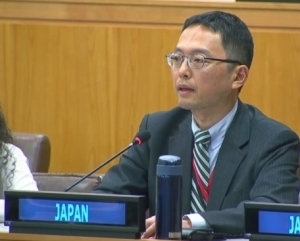Statement by Mr. Sho ONO Minister, Social Affairs, Permanent Mission of Japan to the United Nations, (Item 107 and 108), at the 78th Session of the Third Committee of the United Nations General Assembly
2023/10/2

Mr. Chair,
The rule of law is a foundation for promoting good governance in each country and achieving sustainable development while ensuring no one is left behind. The culture of lawfulness, where people have confidence in and respect fairness and equality of the law and its implementation, serves as the cornerstone of the rule of law. From this standpoint, Japan actively participates in discussions on crime prevention and criminal justice in ECOSOC subsidiary bodies, through making substantial and positive contributions to the establishment of the rule of law in the international community.
Mr. Chair,
The significance of sharing core values has become increasingly crucial in recent times, especially in light of international events such as Russia’s aggression against Ukraine. In this vein, Japan hosted the “Justice Affairs Diplomacy” Ministerial Forum in July this year, where justice ministers from both ASEAN and G7 nations convened for the first time ever. This event held great significance as it provided an opportunity for participants to reaffirm their dedication to promoting core principles like the rule of law and engage in discussions regarding collaborative initiatives between ASEAN and the G7 in the realm of law and justice. Japan remains committed to furthering the cause of the rule of law, in partnership with other Member States, UN entities, and various stakeholders, aligning with the principles outlined in the Kyoto Declaration, which was adopted at the 14th United Nations Congress on Crime Prevention and Criminal Justice, hosted by Japan in March 2021.
Mr. Chair,
The challenge of international drug control has become increasingly complicated. In recent years, we have witnessed a rise in unlawful production, distribution, and nonprescribed use of synthetic drugs, which poses a significant threat to public health and global security. Given that the rise in international travel increases the risk of a surge in unlawful trade of controlled substances and illicit synthetic drugs across borders, the drug trafficking market is rapidly expanding in cyberspace, and that drug supply channels are becoming more and more sophisticated, we must further intensify our efforts in countering these newly emerging threats. Japan, in close coordination with international organizations such as the UNODC, has also actively supported countries that play key roles in the area of drug control through capacity building and facilitating networking among law enforcement authorities. We hope to further contribute to the development of international drug control by utilizing existing knowledge and experience on drug abuse prevention, while acknowledging the importance of proper use of controlled substances for medical purposes.
Mr. Chair,
Triggered by the pandemic, our lives have become more dependent on ICTs, and the threat of cybercrimes, including ones related to new technologies such as cryptocurrency, is growing. Cybercrimes are transnational. For this reason, safe havens should not be allowed, and it is important for each Member State to raise its capacity to implement adequate cybercrime countermeasures. In this regard, Japan has been engaging in capacity-building programs to counter cybercrimes as well as actively participating in discussions at the Ad Hoc Committee (AHC) to elaborate a UN cybercrime convention and promoting the rule of law and international cooperation in cyberspace. We are determined to continue our efforts together with the international community to prevent and combat cybercrimes so that a free, fair and safe cyberspace can be ensured.
Mr. Chair,
Japan trusts that our contributions will help make everyone in the world safer. Japan looks forward to working with other Member States in this respect.
I thank you.
